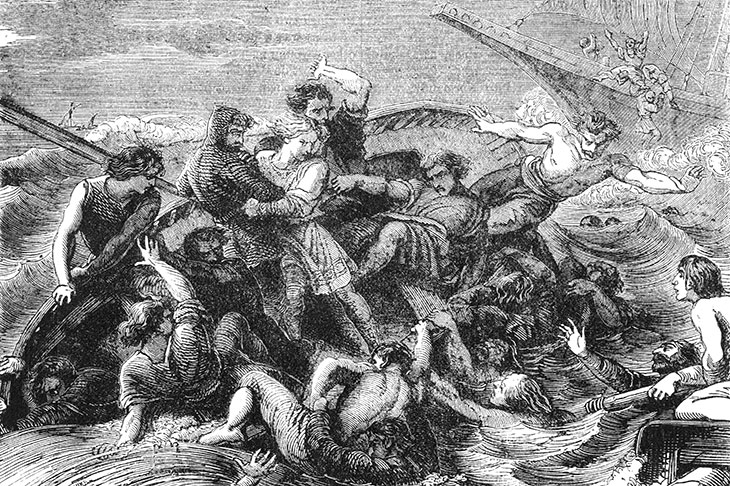Never was a monarch so undone by water as Henry I. A fruit of the sea killed him in 1135: he ate too many lampreys, a jawless, parasitic fish that sucks its prey to death. But the tragedy of his reign occurred 15 years earlier. At the most ill-fated party of the Middle Ages, his heir — the 17-year-old William Ætheling (Anglo-Saxon prince) — drowned when the White Ship sank, taking nearly 300 of his friends and relatives with him.
The ramifications of his death were seismic, leading to a succession crisis that saw thousands die in a bitter civil war. The author of the Anglo-Saxon Chronicle famously described this 19-year-war as a time when ‘The earth bore no corn, for the land was all laid waste… and people said that Christ and his saints slept.’ Torture, kidnappings, burnings and desecrations of church property were commonplace.
Henry I has been neglected by popular culture. He remains little known except among medieval historians and enthusiasts. We have not seen his character starring in a bonkbuster such as The Tudors (despite the fact that he had more than 20 illegitimate children with several different mistresses); nor has he attracted a playwright of the calibre of James Goldman (The Lion in Winter). But Henry’s life was as full of drama as his grandson Henry II’s, and his descendant Henry VIII’s. He has found a master storyteller in Charles Spencer.
No one dared tell Henry about the wreck – until a young boy was persuaded to impart the news
The tragedy of the White Ship is at the heart of Spencer’s book. He tells the story from Henry’s father William the Conqueror’s conquest of England, to the crowning of his grandson Henry II, 19 years after Henry’s death. And what a story.
Henry was the fourth and youngest son of William the Conqueror. He never expected to be king; he spent the years following his father’s death aligning himself to one or the other of his intermittently warring brothers — Robert who inherited Normandy, and William Rufus, England. A fearless opportunist, when Rufus was struck by an arrow in 1100 (possibly engineered by Henry) Henry seized the treasury and was crowned three days later, all while the hapless Robert was on crusade. By the time Robert returned, his little brother was King of England and he had a fight on his hands for Normandy. By 1106, Henry had defeated and imprisoned Robert for life.
Henry, ruthless and ambitious, married Matilda of Scotland, a descendant of the Saxon king Edmund Ironside, just days after his coronation. Their children’s legitimacy, Henry believed, with their blood inheritance of William the Conqueror and the Anglo-Saxon kings of England, would be irrefutable. But despite Henry’s numerous illegitimate children, he and Matilda only had two: Matilda, born in 1102, and William, born the following year. Henry invested all hopes for his Norman dynasty in William. At the Norman harbour town of Barfleur in November 1120, Henry was at the zenith of his rule. He was fresh from his defeat of William Clito (son of Henry’s imprisoned brother Robert) and Louis the Fat of France. He had a new alliance with Normandy’s ancient enemy Anjou, sealed with William’s marriage to Count Fulk’s daughter. He was on his way back to England.
Instead of returning with his father, William travelled with Thomas FitzStephen, owner of an extremely fast ship. Thomas had approached Henry, saying: ‘I have a vessel which is aptly called the Blanche-Nef [White Ship], excellently fitted out and ready for royal service.’
William boarded, together with nearly 300 friends and family, including a half-brother and sister. Also taken aboard, at William’s request, was the alcohol of the town. The drunken passengers and crew departed about midnight. Roughly one nautical mile out of the harbour, the ship collided with the Quilleboeuf rock, ripping through her port side. Passengers and crew were tipped into the freezing sea. There was only one survivor to bear witness — Berold, the butcher of Rouen. A generation of the Anglo-Norman nobility was obliterated.
No one dared tell Henry. His nephew, Theobald, persuaded a young boy to impart the news which he did ‘in tears’. Henry grieved bitterly. The Normans were notorious for gross acts of hostility among family members, including imprisonment and murder, but Henry’s love of William belied the tradition of Norman family hostility.
Spencer’s text, rooted in excellent historical research, delves into fascinating backstories such as the real Macbeth and the prophecies of Merlin. He presents an image of a wily, powerful, successful yet dangerous king, a superb statesman, diplomat and warrior, against the epic backdrop of a family at war. For the scholar, Judith Green’s 2006 biography and Warren Hollister’s study for Yale English Monarchs remain the standard texts. But for the general reader, Charles Spencer has written a lyrical, vivid and compelling portrait. He succeeds in bringing to life huge characters from nearly a millennium ago, with huge emotions, and even huger girths; William the Conqueror was so fat when he died, he had to be squeezed into his tomb, whereupon his guts spilled open.






Comments